
Coconut oil has become fairly mainstream in recent years.
People are adding it to their morning coffee, slathering it over sunburn and using it to make a healthy version of fudge.
It’s good for your health, can help you lose weight and can be used topically to help with skin conditions and dryness.
Some people even use coconut oil as part of their dental hygiene.
Lets look at how coconut oil can benefit your teeth and oral health.
Coconut Oil 101
Coconut oil is obtained from the flesh of the coconut. It’s one of the best sources of saturated fat.
One tablespoon of coconut oil contains 12 grams of saturated fat. Compare that to 7 grams of saturated fat in a tablespoon of butter and 2 grams in olive oil (1).
Although saturated fats have long been thought to contribute to poor cardiovascular health, coconut oil is different. It contains mostly medium-chain triglycerides, or MCTs.
MCTs have fewer carbon atoms and are absorbed by the body differently than long-chain fatty acids. This makes them more likely to be used for energy instead of stored as fat in the body.
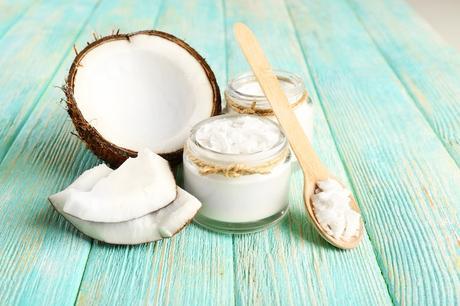
One of the fatty acid components of coconut oil is lauric acid and it makes up more than half of coconut oil’s composition.
Human breast milk is the only other compound that contains this much lauric acid (2).
The antimicrobial properties of lauric acid have been studied for their use in combatting contaminants in the body and on foods (4, 5, 6).
In fact, scientists have found that lauric acid kills these contaminants better than other saturated fats (7).
Lauric acid is converted into monolaurin in the body. Both compounds can combat germs and fungi.
Lauric acid and the resulting monolaurin are responsible for most of coconut oil’s health benefits (3).
Lauric acid and monolaurin combat pathogens by:
- Breaking down the cell walls of certain bacteria and viruses.
- Interrupting communication within the cells.
- Stabilizing the membranes of human cells.
Because the compounds in coconut oil work to damage the cells of the pathogens and reinforce the cells in the human body, bacteria and viruses have not been able to develop resistance to them.
Coconut oil’s antimicrobial properties may be what makes it beneficial for oral health.
KEY POINT: Coconut oil is rich in medium-chain fatty acids, which have health-boosting and antimicrobial properties.
Lauric Acid Combats Bacteria in Your Mouth
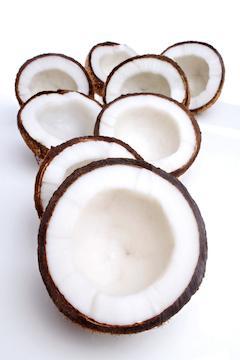
The beneficial antimicrobial properties of coconut oil are not new.
A study published in 1972 found that lauric acid was one of the most effective fatty acids at stopping bacterial growth (8).
Research have noticed that bacteria found in the mouths of people with cavities and gum disease produce fatty acids as they go through their life cycle.
As bacteria grow in the mouth, they provide a surface on which other bacteria can grow. All of these pathogens must communicate with each other to stay alive. This communication may be facilitated by short-chain fatty acids (9, 10).
Streptococcus mutans is the chief contributor of tooth decay. The bacteria secrete acids that eat away at the minerals in your teeth after they eat sugars from the foods that you consume (11).
Introducing short-chain fatty acids and medium-chain fatty acids like lauric acid into the mouth alters the bacterial environment.
Whereas the introduction of many short-chain fatty acids has no effect on bacteria in the mouth, lauric acid inhibits the growth of many types of detrimental bacteria that can cause oral and dental problems (12, 13).
Lauric acid is especially successful at destroying Streptococcus mutans bacteria.
KEY POINT: A specific combination of bacteria in your mouth produces acids that can cause tooth decay and other problems. Introducing lauric acid can kill many of these bacteria.
It Can Prevent Tooth Decay and Loss
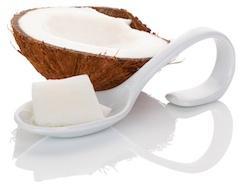
The two main groups of bacteria that cause cavities are Lactobacillus and Streptococcus mutans (17). The fatty acids in coconut oil help to destroy those 2 bacteria types.
Chlorhexidine is an ingredient used in many topical antiseptics and oral therapies. It can help prevent tooth decay.
One study compared the benefits of massaging the gums with chlorhexidine, sesame oil, olive oil and coconut oil.
All of the therapies reduced plaque and improved gingivitis. Coconut oil was found to be just as effective as chlorhexidine (14).
This means that people who want to choose a more natural route for their dental hygiene may want to use coconut oil instead of harsh antiseptics. There are no harmful side effects associated with using coconut oil to prevent tooth decay (15).
Candida albicans, a type of yeast, has also been linked to childhood tooth decay. Consuming excess sugar can contribute to the growth of this substance in the mouth.
Coconut oil acts as an anti-fungal compound, fighting Candida albicans as well as ketoconazole, a popular anti-fungal agent (16).
More studies need to be done to explore the efficacy of coconut oil in comparison to more traditional anti-fungal therapies.
KEY POINT: Coconut oil fights the bacteria that are responsible for tooth decay just as well as more traditional chemical agents.
Coconut Oil Can Diminish Plaque Deposits and Combat Gum Disease
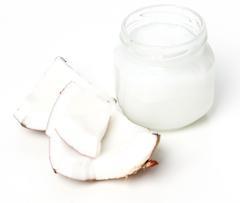
Periodontal disease and gingivitis are caused when the gums respond to bacteria in the mouth by becoming inflamed (17).
When plaque on the teeth is not removed, it turns into a harder substance called tartar.
The longer plaque and tarter remain on the teeth, the more likely you are to develop gum disease (18).
Many people in communities where coconut farming is practiced use coconut oil as a mouth rinse or gargle.
Research have demonstrated that oil pulling, swishing coconut oil in the mouth, can reduce the accumulation of plaque, reducing your risk of gum disease.
One study found that people with gingivitis who added oil pulling to their dental hygiene routine for 30 days diminished the amount of plaque buildup on their teeth (19). Participants saw results after just one week of oil pulling.
KEY POINT: Swishing the mouth with coconut oil can diminish the plaque accumulation that leads gum disease.
Infographic (Pin, Share or Embed)
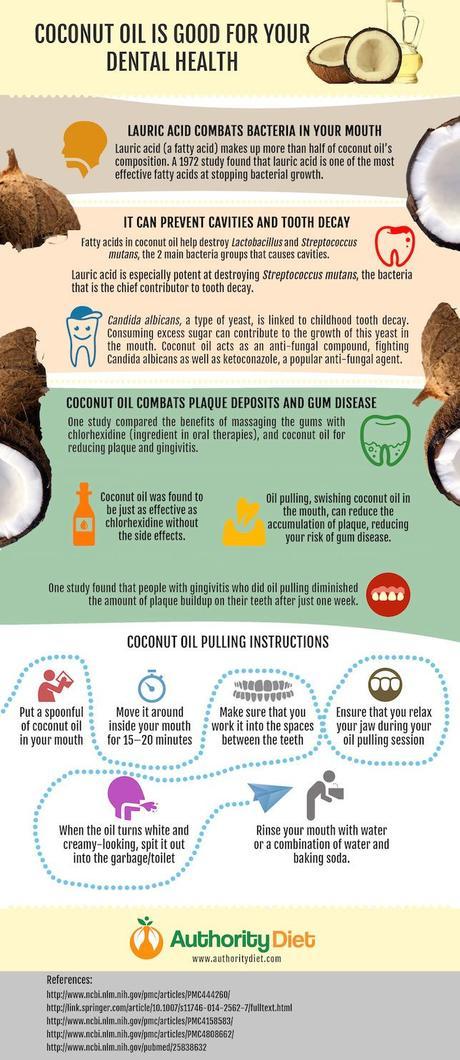
Share This Infographic On Your Site
<p><a href='https://www.authoritydiet.com/why-coconut-oil-good-teeth-pulling-toothpaste/'><img src='https://www.authoritydiet.com/images/i/coconut-oil-teeth-hd.jpg' border='0' /></a><br /><strong>Please include attribution to AuthorityDiet.com with this graphic.</strong></p>
Oil Pulling Instructions

Although more and more people are learning about oil pulling, the practice has been around for thousands of years.
People in India have been using oils to improve their oral health for centuries.
Oil pulling was used to fight cavities, improve bad breath, reduce bleeding of the gums, add moisture to the mouth and strengthen the jaw.
Other cooking oils, like olive and sesame oils, have also been used for oil pulling. However, sesame oil has not been found to be as effective as coconut oil (21).
Today, many people are hoping to reduce the side effects from chemical oral health agents by using more natural compounds (22).
Oil pulling involves more than just rinsing for a few seconds. To properly perform the technique, you should move the oil around in your mouth for 10 to 20 minutes.
The correct oil pulling technique:
- Put a spoonful of coconut oil in your mouth.
- Move it around inside your mouth for 15–20 minutes. Make sure that you work it into the spaces between the teeth.
- Ensure that you relax your jaw during your oil pulling session.
- When the oil turns white and creamy-looking, spit it out into the garbage/toilet.
- Rinse your mouth with water or a combination of water and baking soda.
Do not swallow the oil after it has been swished in your mouth. It contains bacteria and toxins that have been removed from your teeth and oral cavity.
The compounds in coconut oil will help to kill the bacteria that cause plaque, cavities and bad breath.
The slick surface of the oil can help prevent additional bacteria from sticking to the surfaces of your teeth.
KEY POINT: Pull coconut oil through your teeth and move it around your mouth for at least 10 to 20 minutes every day to help fight bacteria and prevent more from forming.
Make Your Own Coconut Oil Toothpaste
Some people prefer to use natural toothpaste made from coconut oil instead of or in addition to an oil pulling therapy.
You can make your own coconut oil toothpaste using common household ingredients.
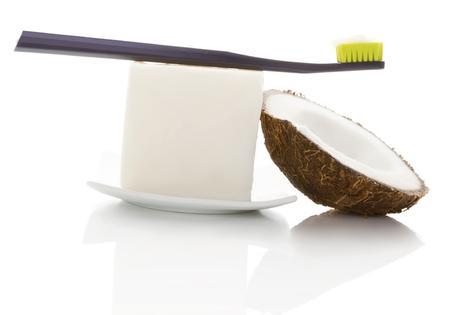
What You Need:
- 1/4 cup coconut oil
- 1 tablespoon baking soda
- 5-10 drops of essential oil (optional, for flavor). Many people use peppermint or cinnamon.
Directions
- Warm up the oil until it melts.
- Mix in the baking soda and essential oil until it forms a paste.
- Store in an airtight container.
The oil will be a more solid consistency in cooler environments. It will become more liquid in warmer temperatures.
To brush your teeth, use a small spoon to add a dime-sized amount of the paste to your toothbrush. Don’t dip a used toothbrush into the paste, or you could add bacteria to the paste.
Brush your teeth for about two minutes, making sure to hit every surface. Don’t forget to brush your tongue. Rinse well with water.
Other Additions to Homemade Toothpaste
You can add other ingredients that may benefit your dental health or make your toothpaste more appetizing, including:
- Bentonite clay powder: Bentonite clay acts as an abrasive to polish the teeth and scrub off bacteria (23).
- Chocolate: Research shows that cacao husk powder may be more effective than fluoride at killing Streptococcus mutans and preventing cavities (24). Crushed cacao nibs can add a chocolate flavor and antibacterial properties to your toothpaste.
- Herbs and essential oils: Thymol and eucalyptol have been proven to be effective agents in mouth rinses (25). Thymol can be found as an herbal supplement in health food stores, and eucalyptol is found in eucalyptus essential oil. A small amount of either substance can be added to homemade toothpaste.
KEY POINT: You can make your own coconut oil toothpaste to replace regular toothpaste and help fight cavities.
Coconut Oil Does Improve Dental Health
Numerous studies prove that coconut oil does fight detrimental bacteria that can cause tooth and gum problems.
Using coconut oil as a mouth rinse or toothpaste can be as effective as many traditional dental products. It’s free of additives and synthetic chemicals, and it’s cost effective.
Coconut oil is easy to incorporate into your dental hygiene routine.
What do you think of using coconut oil for dental health? Share your thoughts below in the comments.

